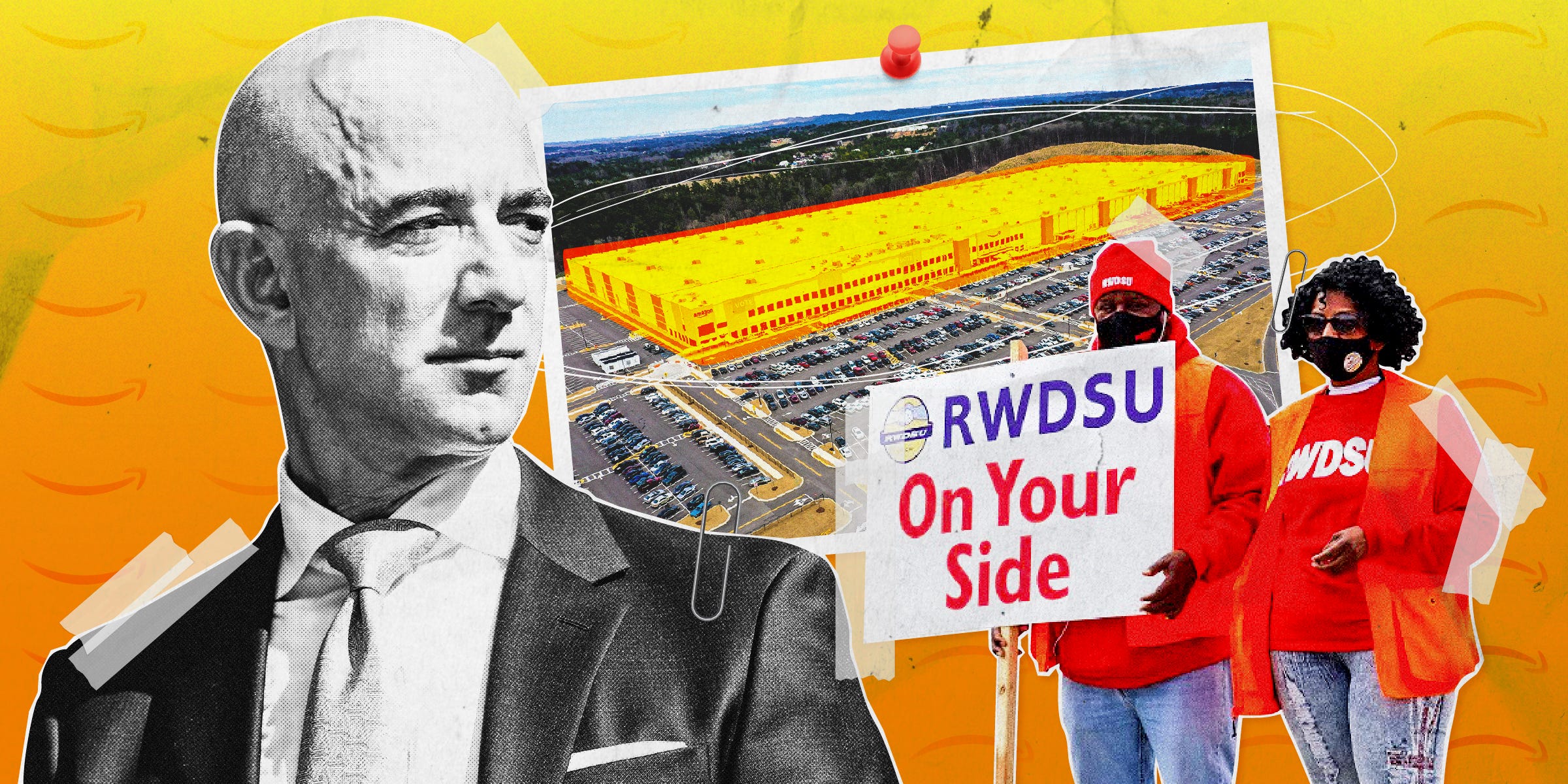
Amazon; Elif Ozturk/Anadolu Agency via Getty; Dustin Chambers/REUTERS; RWDSU; Samantha Lee/Insider
- Workers at an Alabama warehouse are voting whether to form the first Amazon union in the US.
- The vote will finish on March 29. Amazon has been fighting hard to persuade workers to vote no.
- Insider spoke with two warehouse workers about their fight against Amazon's anti-union tactics.
- See more stories on Insider's business page.
Six thousand warehouse workers in Alabama could soon decide the future of a $1.5 trillion tech giant and its 560,000 employees worldwide.
One of those employees, Darryl Richardson, 51, said he was thrilled to work for Amazon when it opened a warehouse in Bessemer, Alabama, in March 2020. But within weeks his excitement waned. He said he watched workers get fired after violating social-distancing rules and be slapped with write-ups for taking time from work to use the restroom or get a drink of water, a complaint other Amazon workers have made.
One day last summer he picked up the phone and called the Retail, Wholesale and Department Store Union, or the RWDSU.
"I was just at home one day, and I just felt like I need to make a phone call to see if I can make some changes," Richardson said. The call helped set into motion a historic battle to unionize the 5,800 workers at the warehouse.
A vote to form a union is now well underway among these workers, and it's scheduled to finish on March 29. Chelsea Connor, a spokesperson for the RWDSU, which is backing the union effort, told Insider she expected a result by Easter.
If the workers vote yes, they would form the first Amazon union in the US, something the tech behemoth has been fighting against for years.
As the effort wraps up, Richardson and another Bessemer worker talked to Insider about what it's been like to try to organize under the watchful eye of a company with a history of aggressive union-busting - and a company led by one of the world's richest men. "They're fighting us real hard," Richardson said.
Amazon has argued that a union would cost workers money in dues and give them benefits they already have.
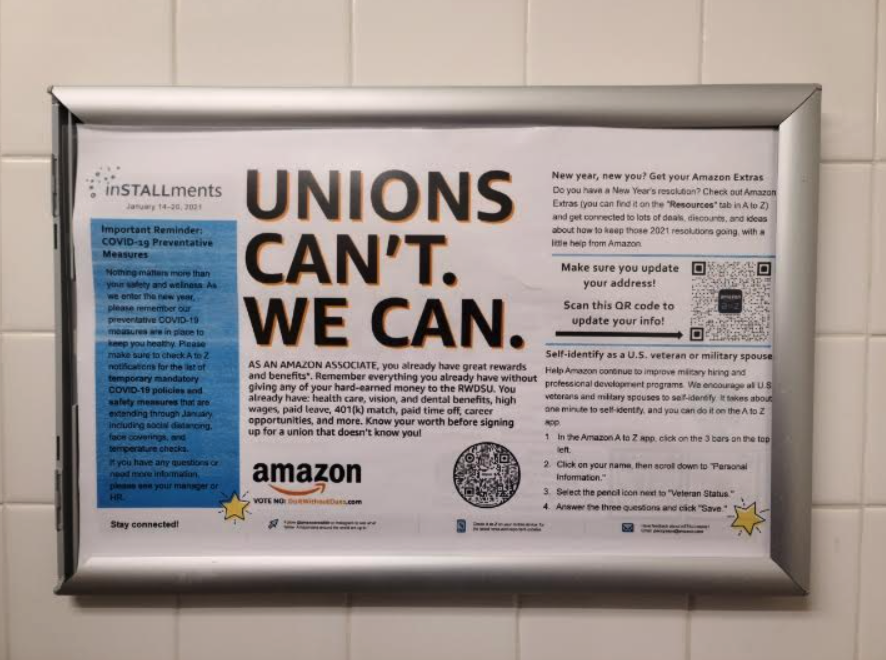
RWDSU
"Amazon already offers what unions are requesting for employees: industry-leading pay, comprehensive benefits from the first day on the job, opportunities for career growth, all while working in a safe, modern work environment," an Amazon spokesperson told Insider.
Jennifer Bates, a Bessemer worker who testified before a Senate subcommittee on March 17, disagreed.
"Amazon brags it pays workers above the minimum wage," Bates said. "What they don't tell you is what those jobs are really like. And they certainly don't tell you what they can afford."
A growing chorus of support for Amazon's first union
The Bessemer campaign has drawn national attention. Earlier this month, President Joe Biden expressed his support for the vote and warned against "anti-union propaganda." Sens. Bernie Sanders and Marco Rubio have thrown their weight behind the union.
And it's not just politicians who are paying attention. The actor Danny Glover showed his support during a visit to the warehouse in February, and the comedian John Oliver joked about the story during a Jimmy Fallon segment in March, asking an Amazon Alexa, "Alexa, what is union busting?"
From Amazon's putting up anti-union signs in the bathrooms to the company sending targeted anti-union ads on Twitch (the streaming service that it owns), reports of union-busting have kept coming.
"All we want is to make Amazon a better place to work, yet Amazon is acting like they are under attack," Bates said in her Senate testimony.
To form the union, the RWDSU needs 50% plus one of the ballots cast, rather than 50% of total employees inside the warehouse. Amazon therefore cannot rely on voters not turning up. It must instead persuade voters to side with the company, rather than with their pro-union coworkers.
One employee pushing for unionization is Catherine Highsmith, 24.
Highsmith, who started working at Amazon's Bessemer warehouse six months ago, quickly moved up from a manual-labor role to monitoring and maintaining the 300-pound robots that roam the warehouse. She works 12.5-hour overnight shifts, which pay $2 more an hour than the warehouse's standard $15.30 wage.
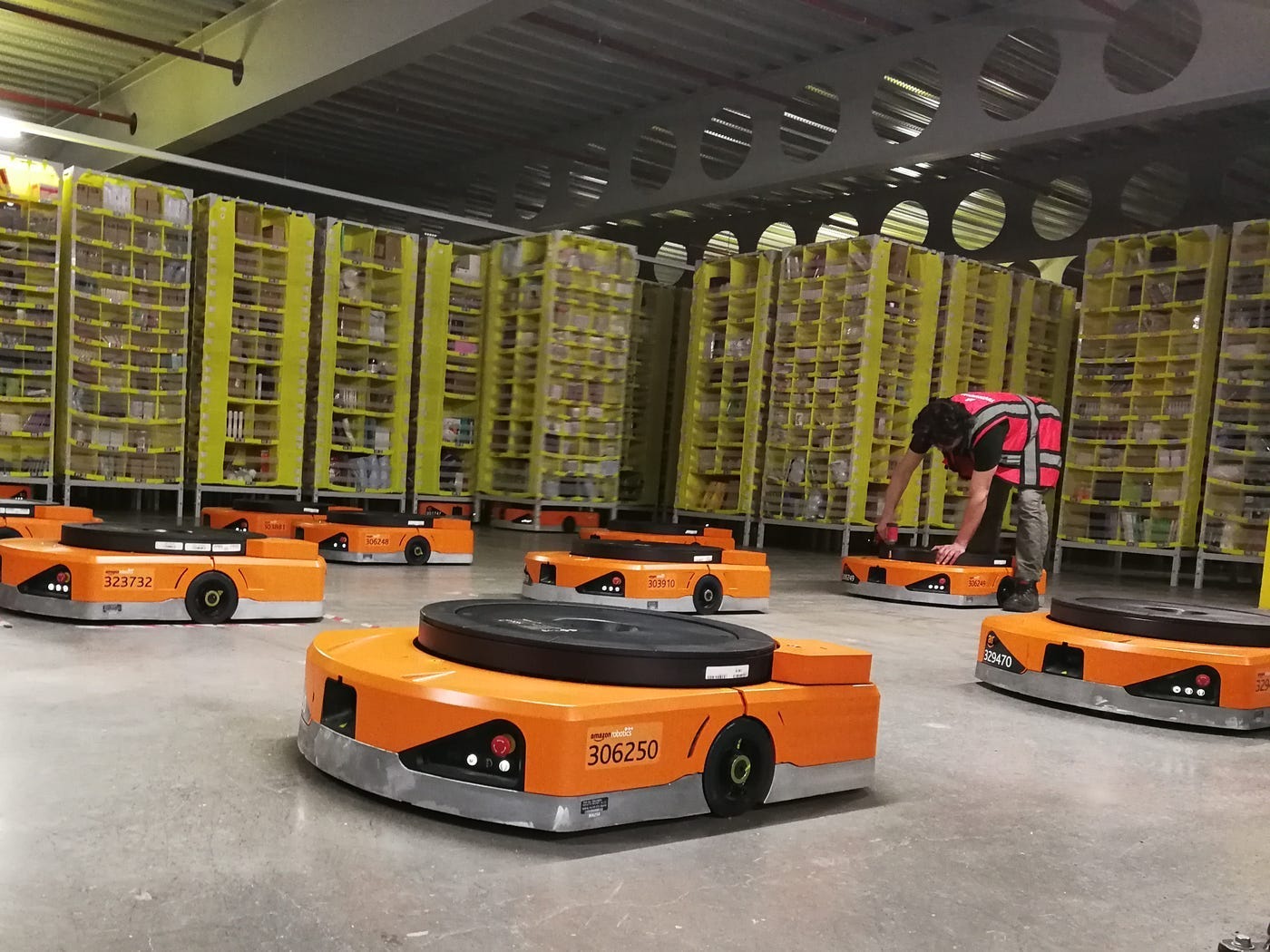
Isobel Asher Hamilton/Insider
Highsmith told Insider that she liked her job, but, like Richardson, she sees problems inside the warehouse. For example, while she's patrolling, waiting for robots to be fixed, she's not allowed to sit down or lean against the wall, she said.
She said workers get unfairly punished for taking "time off task." Time off task is the term Amazon uses for the time workers spend away from their workstations. Workers are allowed only a certain amount of time off task, but they are not told how much they have accrued, or how close they are to getting a write-up, Highsmith said.
"You have no way of knowing - only the process assistants and managers are the people with access to those metrics and can see your time off task," she said, adding that managers can edit an employee's time off task at their discretion.
Midnight meetings, a mailbox, and 'Vote No' pins: Amazon's anti-union tactics
In the runup to February 8, when the vote started, Amazon was quick to try to ward people off unionization.
Richardson said managers held impromptu "stand-up" meetings every day to dissuade workers from voting yes. Staff were told to get up and go to these meetings via a screen at their workstations.
At those meetings, workers watched anti-union videos, and, after one of them, Richardson was kept behind by a manager. "He said, 'We need you on our side,'" Richardson said. He declined.
In a separate interview, with The Washington Post, Richardson said that at one meeting a manager took a photograph of his ID badge, which he interpreted as an attempt at intimidation.
Once the voting officially started, those meetings ceased.
Around November, Highsmith said Amazon representatives from other warehouses came in to ask employees what they thought about the union. They approached staff at workstations, she said.
"Really all they wanted to do is just feel you out," she said.
The Amazon representatives handed out orange pins telling workers to "Vote No," Highsmith said. She threw hers in the trash.
In January, Amazon brought in an outside firm, Highsmith said, to run meetings that the company said would answer questions about unionizing. The meetings ran each week that month, and Highsmith said that one lasted two hours, from midnight to 2 a.m., during her shift.
At first Highsmith said she and her fellow workers were just happy to sit down. The firm showed pictures of contracts and discussed the reasons union negotiations could hurt staff.
Highsmith said that in one meeting the representatives from the outside firm pulled up a picture of a contract that showed pay of roughly $14 as an example. The contract was from a poultry plant and had nothing to do with Amazon, Highsmith told Insider. The representatives didn't show any contracts the RWDSU had negotiated elsewhere, she said.
"They were just deliberately trying to mislead us about how much we could be expecting," she said.
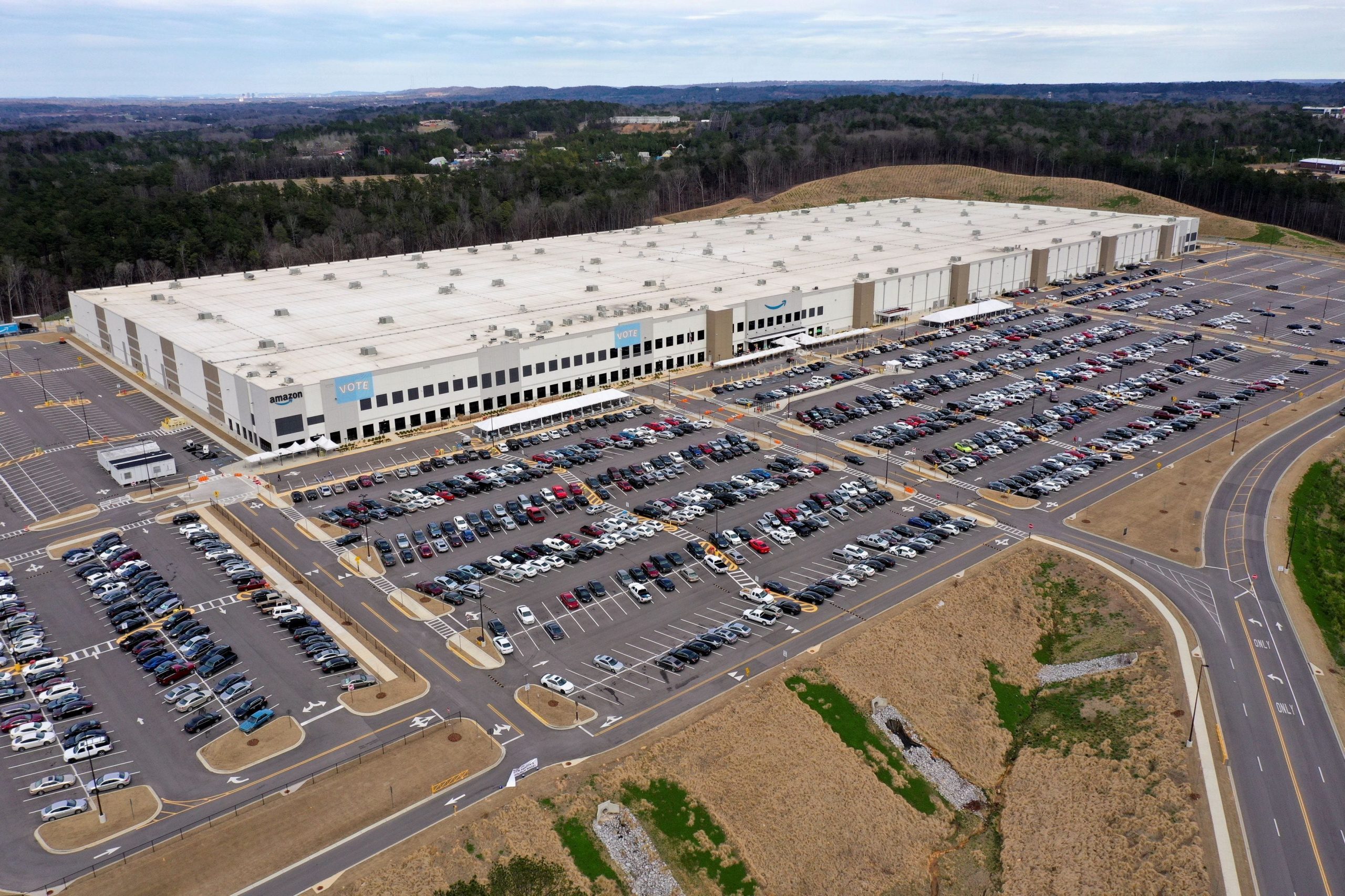
REUTERS/Dustin Chambers
Highsmith said that the outside firm refused to answer questions that could be interpreted as argumentative or pro-union in front of the assembled workers, and that the meetings - with up to 25 people in a room - appeared to violate social-distancing rules that Amazon otherwise strictly enforced.
In her testimony to the Senate, Bates also attested to mandatory "union education" meetings. These meetings lasted up to an hour, she said, adding that she had to attend them several times a week.
An Amazon spokesperson told Insider that it had "hosted regular information sessions for all employees, which included an opportunity for employees to ask questions, and provided other information in various formats."
The spokesperson denied that any meetings exceeded 30 minutes in length, as both Bates and Highsmith had described.
Highsmith said the representatives from the outside firm also handed out materials such as flyers, lanyards, and pins. She said they distributed tchotchkes that looked like door-knockers, designed to stick on workers' rearview mirrors and tell the RWDSU - which set up camp by the road outside the warehouse so that it could talk to workers as they drove to work - not to bother them.
At one of the meetings, Highsmith said she asked about a mailbox that appeared outside the warehouse once voting got underway. Amazon originally fought to make it mandatory for staff to vote in person, but its bid was rejected by the National Labor Relations Board.
The mailbox was first reported as having appeared in late February. "It looks kind of like the one you would see at an apartment building with slots on it," Highsmith said. She asked why Amazon, having been against mail-in votes, had set up the mailbox. She never got an answer, she said, and opted to use her own mailbox when posting her ballot.
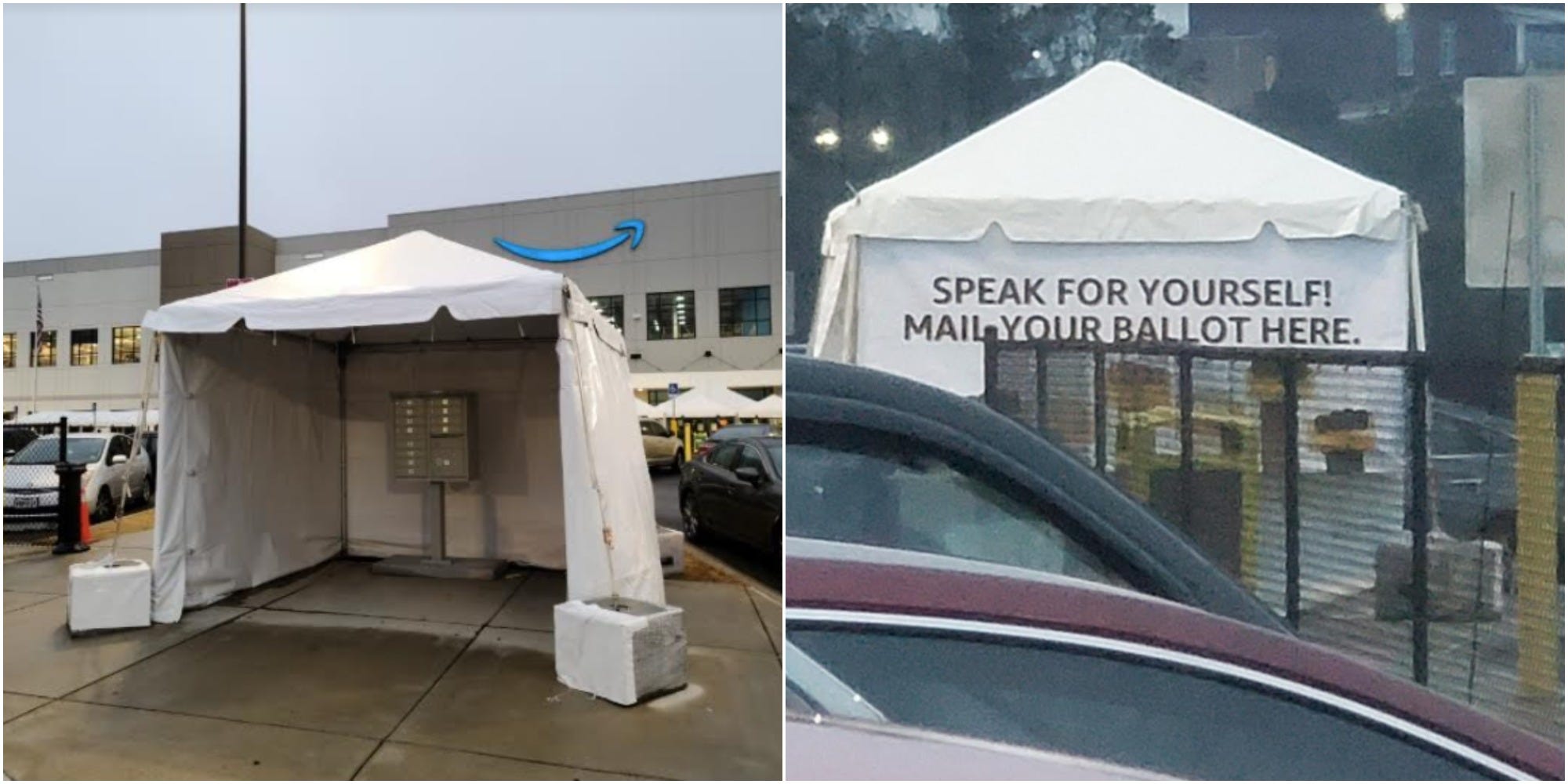
RWDSU
Amazon's spokesperson told Insider that USPS installed the mailbox "for the convenience of our employees."
"This mailbox is enclosed in a tent making it convenient, safe, and private for our employees to vote on their way to and from work if they choose to, or use it for any of their other mailing needs," the spokesperson said. "Only USPS can collect the outgoing mail from this box or put incoming mail into it."
In a photo shared with Insider by the RWDSU, emblazoned on one side of the tent are the words "SPEAK FOR YOURSELF! MAIL YOUR BALLOT HERE."
Amazon's campaign spills outside the warehouse
Amazon's anti-union efforts have been well publicized. In February, Amazon took out anti-union ads on the streaming platform Twitch. Twitch, which Amazon owns, removed the ads, saying it did not host political advertising and that the ads "never should have run."
The pro-union group More Perfect Union reported that Amazon petitioned local authorities to change the timing on the traffic lights outside the warehouse, so that they changed more quickly from red to green. The RWDSU claimed this was a ploy to stop its members from talking to workers stopped at red lights.
Jefferson County authorities initially denied changing the lights, but a week later said they had been recalibrated in December after Amazon notified them of "traffic delays."
Amazon's spokesperson said it was normal for large employers to make traffic requests to authorities.
"We have nearly 2,000 people who can be leaving a shift at any given time, and this gets especially busy for us during holiday peak season," the spokesperson said. "So it's normal to work with local officials to assess traffic patterns and adjust as needed and there is no story there."
Amazon is accused of disseminating misinformation
Highsmith said that Amazon's barrage of anti-union messaging contained misinformation about the union.
She recalled hearing the anti-union representatives say during meetings that the union would not help workers who failed to pay their dues.
Connor, of the RWDSU, told Insider that was inaccurate. If a union contract were signed, it would cover all workers in the warehouse, she said.
Highsmith said representatives from the outside firm told workers that everyone would have to pay $500 in annual fees whether they wanted to join the union or not. Alabama is a right-to-work state, meaning workers are not obligated to join a union, and nonunion members do not have to pay toward the cost of a union.
Richardson said Amazon managers also disseminated false information during the "stand-up" meetings. For example, he said they told workers that if the union called a strike, workers would have no choice but to strike. Connor said that was false.
Bates also said in her testimony that "a lot of what was said in those meetings was untrue" - including that workers would lose their benefits if they joined the union. "It was upsetting to see some of the younger people who were really on board with the union get confused by what was being said in the meetings," she added.
Although the meetings led by the outside firm ceased once the ballot began in February, Highsmith said she still gets text messages from Amazon. The texts tell her and other Bessemer workers that "the union can't promise you anything" and encourage employees to "be done by 3/1" - despite the fact workers have until March 29 to cast their votes.
"They often come through almost five times a day," Highsmith said.
The RWDSU shared screenshots of texts sent to workers with Insider. "Don't let outsiders divide our winning team!" one read, adding: "We don't believe that you need to pay someone to speak for you or that you need to pay dues for what you already get for free."
Another text said the warehouse opened during a "challenging time," meaning the workers had "not really had time to get to know each other."
"Let's be honest, we don't even know what we all look like without our masks. Don't let the union divide us!" it added.
Amazon spread its anti-union message in public, too, setting up a website called "Do It Without Dues" targeted at workers in the Bessemer warehouse. The site hammers home the idea of a $500 annual fee.
"Be a doer, not a due'r," a line on the site reads.

Amazon's "Do It Without Dues" Website
Connor said $500 wasn't an improbable fee, but that the price of union dues would only be voted on once, and if, the union agreed on its first contract with Amazon.
Amazon's spokesperson said an RWDSU flyer had cited $500 as an estimated cost of dues. Connor denied that.
"There were flyers early on in the campaign that spoke to dues structure, but none said $500 annually. Dues range at our workplaces," she said.
Highsmith and Richardson said Amazon's tactics have spooked some of the employees at Bessemer.
"I think that a lot of people, unfortunately, are scared of them, and they're scared that they could lose their job," Highsmith said.
Richardson said he speaks to fellow employees every chance he gets to try to counter Amazon, but such opportunities are few and far between. "The way we work you can't move, you're tied down, you barely have the opportunity to go to the bathroom," he said.
This makes catching people for a chat on the warehouse floor impossible, so Richardson uses the two breaks he gets in his 10-hour shift instead.
Fighting against a culture of hyper-individualism
Highsmith said Amazon's corporate culture feeds into a divide-and-conquer strategy.
"Amazon is hyper-individualistic," she said. "They want you to think you are one person in 5,500 single units, and it's all about your productivity. And if you fail, then you are a failure. You're a bad person."
That hyper-individualism has played directly into Amazon's anti-union rhetoric, she said. Of the anti-union materials provided by the company, Highsmith said: "It's a lot of talk, like, 'I don't need anybody to speak for me' … they're all saying the same thing: 'me.'"
Richardson said he was scared the day he called the RWDSU. He's been involved in unions in the past, and knows that companies sometimes retaliate. "I was scared, I took a chance. On the other hand, I just felt like it needed to be done," he said. "Right now I'm still scared, in a way," he said. "I just take it one day at a time."
This week, Vice reported that the National Labor Relations Board filed a complaint against Amazon, claiming it had interrogated a worker in Queens after he led an employee walkout. The case was settled out of court. Amazon said it disagreed with the allegations, but that it was "pleased to put this matter behind us."
Richardson said he was optimistic that the vote would pass, based on his conversations with employees.
Despite Amazon's fierce campaigning, the union drive appears to be having a knock-on effect among other Amazon staff in the US. On March 9, the RWDSU said it had received enquiries from more than a thousand Amazon workers around the country since voting in Bessemer began.
"It would help very much if Alabama votes yes," a worker who said they had asked about starting a union at their own warehouse told The Washington Post. "The chances that we'll do something increases."
Bessemer could be just the first domino to fall, which could explain why Amazon is fighting so hard.
"The whole point of the union is the antithesis to Amazon's culture, right?" Highsmith said.
"The union says 'We.' The union says 'We have the power.'"
Do you work at Amazon? Got a tip? Contact this reporter at [email protected] or [email protected]. Always use a nonwork email.